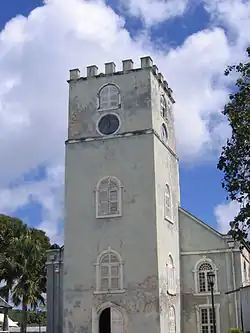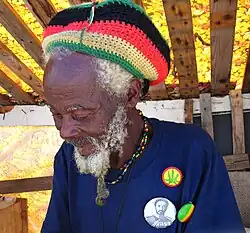Religion in Barbados
| Religion by country |
|---|
|
|
Religion in Barbados is predominantly Christian. Religious freedom is established by law and generally enforced in practice, although some minority religious groups have complaints about government practices that interfere with their beliefs.
- Protestants (33.7%)
- Anglicans (28.8%)
- Other Christians (32.1%)
- Irreligious (1.90%)
- Bahá’ís (1.20%)
- Others (1.30%)
- Protestant (total) (66.4%)
- Roman Catholic (3.80%)
- Other Christian (5.40%)
- Rastafarian (1.00%)
- Other religions (1.50%)
- None (20.6%)
- Unspecified (1.20%)
A significant population in Barbados is irreligious or identify with no religious institution, with 45.5% of the population (62,000 people out of 136,365) reporting no religion in the 2021 Barbados census.[1]
History
According to Historian Larry Gragg (Missouri University of Science and Technology - 2009), the Quakers community was first concentrated in and around Barbados before moving en masse Pennsylvania. The island was the first stop for slave ships coming from Africa, and the Quackers developed a balanced social environment "to challenge the practices of the planter class". In a 1860 census, 500 of the 20,000 white people in Barbados were Quackers. However, by the end of the 18th century, the Quackers culture had vanished, partly due to the persecution of the Church of England.[2]

Religious affiliations 1970, 2010 and 2022
The reference work Religions of the World provides the following data for Barbados:[3]
| Religion | Followers in 1970 | Followers in 2010 | % of Population 2010 | % of population in 2022[4] |
|---|---|---|---|---|
| Christians | 235,000 | 284,000 | 95.5% | 75,6% |
| Protestants | 50,600 | 100,000 | 33.7% | 66.4% |
| Anglicans | 90,000 | 85,600 | 28.8% | 23.9% |
| Pentecostal | 19.5% | |||
| Adventist | 5.9% | |||
| Methodist | 4.2% | |||
| Wesleyan | 3.4% | |||
| Nazarene | 3.2% | |||
| Church of God | 2.4% | |||
| Baptist | 1.8% | |||
| Moravian | 1.2% | |||
| other Protestant | 0.9% | |||
| Roman Catholic | 3.8% | |||
| Jehovah's Witness | 2% | |||
| other Christian | 3,4% | |||
| Rastafarian | 1% | |||
| None | 20.6% | |||
| Others | 8,900 | 16,000 | 32.1% | 1.5% |
| unspecified | 1.2% | |||
| Agnostics | 2,400 | 5,100 | 1.7% | |
| Bahá’ís | 1,300 | 3,600 | 1.2% | |
| Muslims | 400 | 2,300 | 0.8% | |
| Hindus | 100 | 980 | 0.3% | |
| Atheists | 0 | 700 | 0.2% | |
| New religionists | 50 | 480 | 0.2% | |
| Buddhists | 0 | 120 | 0.0% | |
| Spiritists | 0 | 60 | 0.0% | |
| Jews | 30 | 40 | 0.0% | |
| Ethnoreligionists | 0 | 30 | 0.0% | |
| Total Population | 239,000 | 297,000 | 100.0% | 100.0% |
Although Catholics are missing from the above chart, the same reference book gives their percentage as 4 percent in 1980 and 4.2 percent in 2000.[5]
Rastafarianism

The Rastafarian Movement was introduced to Barbados in 1975,[6] influenced by its Jamaican origins and the teachings of Marcus Garvey.[7] As of 2010, Rastafarians represented about 1% of the national population, or roughly 3,000 people.[4]
In 2019, the government legalized the religious use of cannabis for Rastafarians and granted 60 acres (24 ha) of land for cultivation.[8] Some community leaders have criticized the Sacramental Cannabis Act for limiting its use to places of worship and requiring permits for consumption elsewhere.[8]
In April 2025, the University of the West Indies at Cave Hill hosted a panel marking the 50th anniversary of the Rastafari Nyabinghi Tabernacle in Mount Carmel, St. John, recognizing its role in preserving Rastafarian culture in Barbados.[9]
Religious freedom
The constitution of Barbados provides for the freedom of religion and prohibits discrimination based on creed;[10] there is a law against "blasphemous libel" but it is unenforced.
Religious groups are allowed to establish private schools and provide religious instruction, with some support from the government; education in Christian values is taught in primary schools, with several religions being taught at secondary level (students may opt out).[10]
The local community launched the bi-weekly publication The Rastafari Vision (TRV) in 2021.[11] Representatives of the Rastafari community have objected to mandatory vaccinations for schoolchildren.[10]
See also
- Anglican Church of Barbados
- Bahá'í Faith in Barbados
- Barbadian Jews
- Catholic Church in Barbados
- Hinduism in Barbados
- Islam in Barbados
- Methodism in Barbados
References
- ^ "BSS clears air on 2021 census data". Barbados Today. 28 May 2024. Retrieved 30 April 2025.
- ^ Technology, Missouri University of Science and (2009-07-13). "Historian's new book examines Quaker community of Barbados". News and Events. Retrieved 2025-03-10.
- ^ Melton, J. Gordon; Baumann, Martin (2010). Religions of the World: A Comprehensive Encyclopedia of Beliefs and Practices (2nd ed.). ABC-CLIO. p. 300. ISBN 978-1598842043. Retrieved 28 September 2015.
- ^ a b "Barbados – 2022 World Factbook (Archive)". 2022. Retrieved 10 August 2025.
- ^ Melton, J. Gordon; Baumann, Martin (2010). Religions of the World: A Comprehensive Encyclopedia of Beliefs and Practices (2nd ed.). ABC-CLIO. p. 301. ISBN 978-1598842043. Retrieved 28 September 2015.
- ^ Melton, J.G.; Baumann, M. (2010). Religions of the World: A Comprehensive Encyclopedia of Beliefs and Practices: A Comprehensive Encyclopedia of Beliefs and Practices. ABC-CLIO. p. 304. ISBN 9781598842043. Retrieved 2015-05-13.
- ^ "Rastafari in Barbados". Barbados.org. Retrieved 10 August 2025.
- ^ a b Best, Anesta (8 March 2024). "Rastas wary of Govt help in medicinal marijuana". Barbados Today. Retrieved 10 August 2025.
- ^ "The Light of Rastafari in a World of the Chaos – Panel marks Nyabinghi Golden Jubilee". University of the West Indies, Cave Hill Campus. April 2025. Retrieved 10 August 2025.
- ^ a b c US State Dept, 2022 report on Barbados
- ^ Traffic, Barbados Today (2021-07-21). "Rastafari community launches new publication". Barbados Today. Retrieved 2025-03-10.